

Anglosaxon Literature and Prose - Beaming Notes. The Germanic forefathers of the English brought with them their own poetry but there is no evidence of them bringing any prose writings.
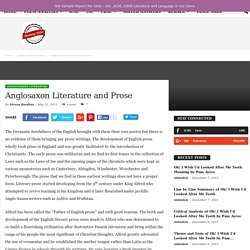
Anglo-Saxon literature: Prose. Old English literary prose dates from the latter part of the Anglo-Saxon period.

Prose was written in Latin before the reign of King Alfred (reigned 871–99), who worked to revitalize English culture after the devastating Danish invasions ended. As hardly anyone could read Latin, Alfred translated or had translated the most important Latin texts. He also encouraged writing in the vernacular. Intro to Anglo Saxon culture and literary elements. Epic World History: Anglo-Saxon Culture.
The Anglo-Saxons were Germanic barbarians who invaded Britain and took over large parts of the island in the centuries following the withdrawal of the Roman Empire.
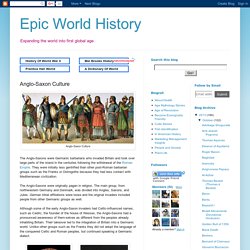
They were initially less gentrified than other post-Roman barbarian groups such as the Franks or Ostrogoths because they had less contact with Mediterranean civilization. The Anglo-Saxons were originally pagan in religion. The main group, from northwestern Germany and Denmark, was divided into Angles, Saxons, and Jutes. German tribal affiliations were loose and the original invaders included people from other Germanic groups as well. The History of English - Old English (c. 500 - c.1100) About 400 Anglo-Saxon texts survive from this era, including many beautiful poems, telling tales of wild battles and heroic journeys.
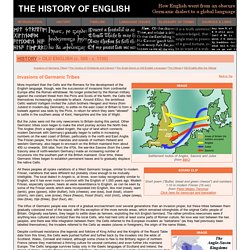
The oldest surviving text of Old English literature is “Cædmon's Hymn”, which was composed between 658 and 680, and the longest was the ongoing “Anglo-Saxon Chronicle”. But by far the best known is the long epic poem “Beowulf”. “Beowulf” may have been written any time between the 8th and the early 11th Century by an unknown author or authors, or, most likely, it was written in the 8th Century and then revised in the 10th or 11th Century. It was probably originally written in Northumbria, although the single manuscript that has come down to us (which dates from around 1000) contains a bewildering mix of Northumbrian, West Saxon and Anglian dialects.
The 3,182 lines of the work shows that Old English was already a fully developed poetic language by this time, with a particular emphasis on alliteration and percussive effects. 5 Accomplishments of Julius Caesar. Julius Caesar was a great Roman leader at the end of the Roman Republic.
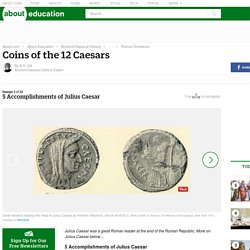
More on Julius Caesar below.... 5 Accomplishments of Julius Caesar Julius Caesar was a general, a statesman, a lawgiver, an orator, and historian. He never lost a war. Caesar fixed the calendar. Who Was Caesar? In case you're reading this list of accomplishments without a grounding, here's a quick overview of Julius Caesar. Alfred the Great: The Most Perfect Man in History? King Alfred of Wessex (r.871-99) is probably the best known of all Anglo-Saxon rulers, even if the first thing to come into many people’s minds in connection with him is something to do with burnt confectionery.
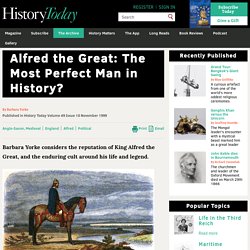
The year 1999 saw the 1100th anniversary of his death on October 26th, 899, at the age of about 50. The occasion is being marked with conferences and exhibitions in Winchester, Southampton and London, but the scale of celebrations will be modest compared with those which commemorated his millenary, and culminated in the unveiling by Lord Rosebery of his statue in Winchester. Alfred’s reputation still stands high with historians, though few would now want to follow Edward Freeman in claiming him as ‘the most perfect character in history’ (The History of the Norman Conquest of England, 5 volumes, 1867-79). Alfred is someone who has had greatness thrust upon him. How and why did he acquire his glowing reputation, and how does it stand up today? The Anglo-Saxon Influence on Romano-Britain: Research past and present.
Charlotte Russell University of Durham Abstract: The Romano-British to Anglo-Saxon transition in Britain is one of the most striking transitions seen in the archaeological record.
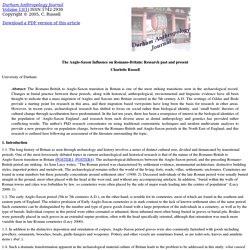
Changes in burial practice between these periods, along with historical, anthropological, environmental and linguistic evidence have all been thought to indicate that a mass migration of Angles and Saxons into Britain occurred in the 5th century A.D. The writings of Gildas and Bede provide a starting point for research in this area, and their migration based viewpoints have long been the basis for research in other areas. However, in recent years, archaeological research has shifted to focus on social rather than biological identity, and `small bands' theories of cultural change through acculturation have predominated. 1.1. 1.2. 1.3. Anglo-Saxon immigration and ethnogenesis. Medieval Archaeology 55, 2011. 1-28.
Anglo-Saxon. History - Ancient History in depth: The Anglo-Saxons. The Adventures of Beowulf. Beowulf. Beowulf is the longest epic poem in Old English, the language spoken in Anglo-Saxon England before the Norman Conquest.
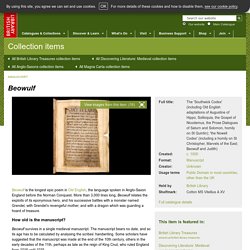
More than 3,000 lines long, Beowulf relates the exploits of its eponymous hero, and his successive battles with a monster named Grendel, with Grendel’s revengeful mother, and with a dragon which was guarding a hoard of treasure. How old is the manuscript? Beowulf survives in a single medieval manuscript. The manuscript bears no date, and so its age has to be calculated by analysing the scribes’ handwriting.
Exclusive Medieval Articles - Christianity in Beowulf. Works often provide a great deal of insight about the time period during which they were written.
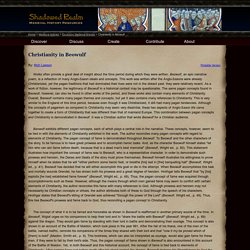
Beowulf, an epic narrative poem, is a reflection of many Anglo-Saxon ideals and concepts. This work was written after the Anglo-Saxons were already Christianized, yet the pagan traditions that had dominated their lives were not in the distant past; they were relatively recent. As a work of fiction, however, the legitimacy of Beowulf in a historical context may be questionable. The same pagan concepts found in Beowulf, however, can also be found in other works of the period, and these works also contain many elements of Christianity.
Overall, Beowulf contains many pagan themes and concepts, but yet it also contains many references to Christianity. Beowulf exhibits different pagan concepts, each of which plays a central role in the narrative.